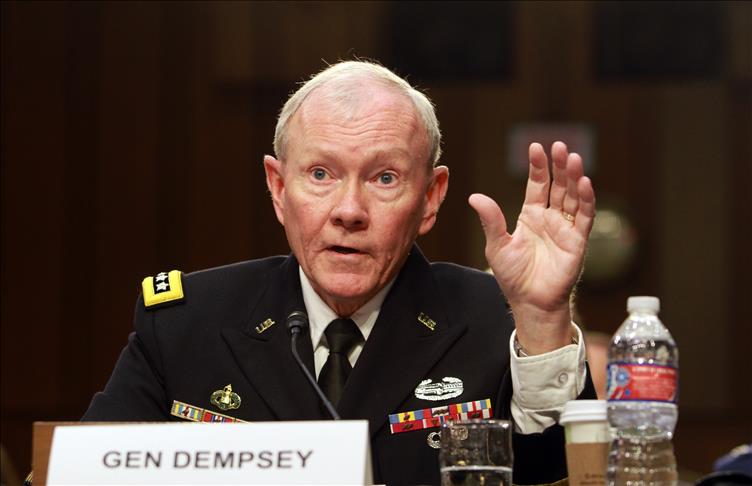Top US general says ground troops possible against ISIL
White House denies that combat troops are an option

WASHINGTON
America’s top military leader told a Senate panel Tuesday that he would recommend sending American ground troops to Iraq should an expanded air campaign against the Islamic State of Iraq and the Levant fail, but the White House continued to insist that combat troops would not be used in military operations.
“If we reach the point where I believe our advisers should accompany Iraqi troops on attacks against specific ISIL targets, I’ll recommend that to the president,” said Army Gen. Martin Dempsey, chairman of the Joint Chiefs of Staff.
Under a new strategy announced by President Barack Obama last week, the U.S. will lead an international coalition to carry out airstrikes against the militants throughout Iraq, and would for the first time strike them in Syria.
Dempsey said that if the coalition fails to rout the ISIL, “I, of course, would go back to the president and make a recommendation that may include the use of U.S. military ground forces.”
Obama has maintained that ground troops would not be used in combat operations against ISIL.
White House Press Secretary Josh Earnest backtracked from Dempsey’s words while speaking to reporters, saying that the president's policy has not changed.
“The president has been clear about what that policy is,” Earnest said. “He reiterated it on a number of occasions; most recently, I believe in his address to the nation on Wednesday night, which is that the president does not believe that it would be in the best interest of our national security to deploy American ground troops in a combat role in Iraq and Syria. That policy has not changed,” he said.
"I'm confident that if you asked Gen. Dempsey if he’s on the same page as the commander-in-chief that he would say that he is," Earnest added.
The Pentagon announced Monday the first airstrikes under the expanded strategy, with an attack that destroyed an ISIL fighting position southwest of Baghdad. The strike was followed by five others through Tuesday, three of which were southwest of Baghdad.
U.S. Central Command has carried out a total of 167 airstrikes in Iraq since Obama first gave authorization in August to carry out strikes.
U.S. Secretary of Defense Chuck Hagel cautioned that the fight against the militants is likely to take some time.
“If left unchecked, ISIL will directly threaten our homeland and our allies,” Hagel told the panel. “This will not be an easy or a brief effort. It is complicated. We are at war with ISIL, as we are with al-Qaida. But destroying ISIL will require more than military efforts alone.”
Hagel and Dempsey testified Tuesday before the Senate Armed Services Committee.
Sen. James Inhofe cautioned that Obama’s strategy might not go far enough, however.
“It will take an army to beat an army. But instead the president presented a limited counterterrorism strategy that he compared to his approach in Yemen and Somalia,” he said. "The difference between al-Qaida in Yemen and Somalia and that of ISIS are enormous, and our strategy for each should reflect that reality. Taking this 'one size fits all' is destined for failure."
The CIA estimates that ISIL has some 31,000 fighters in its ranks.
As part of the expanded strategy, the U.S. plans to redouble efforts to train Iraqi security forces, and vet members of the Syrian opposition. The Pentagon plans to train, equip and resupply more than 5,000 Syrian fighters per year at facilities in Saudi Arabia under a $500 million plan.
“Five thousand alone is not going to be able to turn the tide, we recognize that, on this side,” Hagel said. “But the 5,000 per year, and we may do better, we might be able to do better, but we don’t want to overstate or overpromise because we want the right people.”
Hagel said that the U.S. would initially supply the fighters with small arms, vehicles and basic equipment, in addition to tactical and strategic training.
Even so, recruiting for the program has yet to begin, according to Dempsey.
The process and methods needed to vet Syria’s warring factions will likely significantly limit the number of groups that Washington will be able to work with in a country that has seen more than three years of bloody conflict, and the atrocities and reprisals that have taken place.
Anadolu Agency website contains only a portion of the news stories offered to subscribers in the AA News Broadcasting System (HAS), and in summarized form. Please contact us for subscription options.

